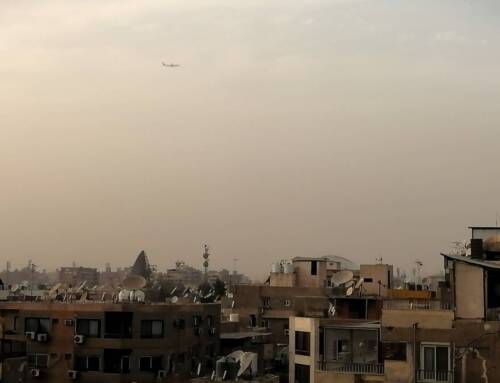Suwayda protesters demand answers after kidnapping negotiations collapse, second IS captive executed
Protesters blocked streets in Suwayda city on Wednesday. Photo courtesy […]
4 October 2018

AMMAN: Protests in Syria’s southern government-held Suwayda province continued for a second day on Thursday, following the execution earlier this week of a local woman held captive by the Islamic State.
The execution is the second by the Islamic State (IS) since the hardline militant group captured some 30 people—almost entirely women and children—from a series of villages in rural eastern Suwayda during a devastating surprise attack on the majority-Druze province in July. More than 250 civilians reportedly died in the assault.
Dozens of residents gathered outside government offices in the province’s eponymous capital on Wednesday and Thursday, brandishing photographs of abductees and loved ones captured by IS. In one video from the protest, a woman can be seen desperately calling for answers as demonstrators look on. “Where did they go?” she cries repeatedly.
Protesters and residents in Suwayda are demanding that Syrian government authorities and allied Russian forces do more to secure the release of the remaining hostages.
“It’s my duty,” Tariq, an activist from Suwayda, told Syria Direct on Thursday, requesting a pseudonym for fear of repercussions for speaking to press. He added that demonstrators were working to pressure those negotiating with IS to secure the remaining captives’ release.
Demonstrators gathered outside the municipality building in Suwayda since Wednesday had yet to receive a response from local authorities, Tariq claimed.
For weeks, resentment has been simmering in Suwayda province among residents who claim that local and national authorities have done little to secure the release of the hostages.
Negotiations to free the remaining 27 IS-held captives have yielded few results.
Photos of IS hostages outside government offices in Suwaya city Thursday. Photo by Noura al-Basha.
On Tuesday, a committee of local community figures that had been tasked with negotiating the hostages’ release announced it was disbanding. The announcement came just hours before news of 25-year-old female captive Thawat Abu Ammar’s execution later that day.
A statement from the negotiating committee said the body had “worked hard to reach the desired results, which we hoped would culminate in the release of the kidnapped,” adding that, “unfortunately we didn’t reach this result.”
Committee member Osama Abu Deekar told Syria Direct that the body struggled to establish a line of communication with IS and never received “any information or demands from the kidnappers.”
“Neither the Syrian state nor Russia received the committee, or tried to work with [it].”
“We contacted the regime,” Abu Deekar added, “but there was no reply.”
Local resentment towards the Syrian government has been simmering ever since IS launched the surprise, multi-pronged attack on Suwayda city and a series of villages in the eastern Suwayda countryside in July that left hundreds dead.
The attack came in the wake of evacuations, organized by the Syrian government, whereby IS fighters from other areas of the country were transported into a remote desert area in the country’s interior.
Fighters from formerly IS-held areas, including the Yarmouk Palestinian refugee camp in the south Damascus suburbs, were bussed towards the Badia region—a vast, barren swathe of desert and volcanic rock that begins in the eastern reaches of Suwayda province and stretches across central and eastern Syria. They were later joined by hundreds of IS-affiliated militants from southwestern Daraa province.
Syrian army units, Lebanese Hezbollah fighters and affiliated pro-government militias have reportedly been fighting IS militants in the Badia—one of the group’s last footholds in Syria—since July.
Suwayda is Syria’s southernmost province, and home to most of the country’s Druze minority. Though officially under government control, much of Suwayda’s civil and military authority comes from within. A host of homegrown political and military factions hold sway inside the province, mainly focused on defending it from outside attackers.
Suwayda’s Druze political leadership remains largely neutral and focused on internal affairs.
With additional reporting by Noura al-Basha and Zainab Hasan.








